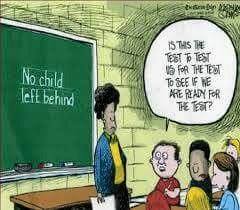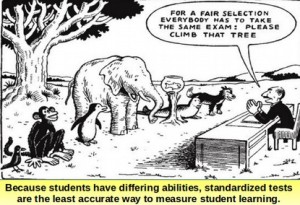“If it walks like a duck, quacks like a duck, looks like a duck, it must be a duck”
Or is it a Goose?
I awoke Friday morning excited to be facing a four day weekend. Cup of coffee in hand, I sat down to my computer to catch up on news and here is the first post I read:
“I am baffled, perplexed, confused, and a little dumb-founded that a research-based approach to teaching young children, to age 8, is being dismissed by educators who are also advocates for these same young children. Spending the last year, or more, entrenched in the national board professional teaching standards, DAP (Developmental Appropriate Practice) was absolutely important. Teaching on the edge of a child’s understanding is important. Knowing where a child is developmentally so you know what question to ask to get them to the next level is important. Asking children to do something they can’t do or are not ready for yet is disrespecting a child. Help me understand why this is even an issue.”
I looked at the comment tab and already the responses were flying.
I know this well respected, veteran, accomplished teacher personally. Our history goes way back to our work at the state level.
As I scrolled, I found the comment made by another accomplished primary level teacher, inquiring if any of us saw the district post about “Developmentally Appropriate Practice” and the “scolding” it entailed.
What?
I instantly went to the district webpage and found this post for the week of Feb. 11 – 17:
“What is developmentally appropriate practice? This phrase gets thrown around a lot in the educational community. This short article summarizes the current research on the topic. Teachers that we have shared this with commented that they found it insightful given the recent adoption of standards and curricular materials.”
My blood pressure went up a notch. I had been sent the very same article to read in response to my letter to the District Elementary Curriculum Coordinator two weeks prior. The teacher’s inquiry and feelings hit me hard enough, I could do very little else for the rest of my day, but write. My original retort, “A Mince of Words… I see a Duck… I hear a Duck,” can be read (here).
It seems it is thought the phrase ‘developmentally appropriate’ gets thrown around a lot in the educational community… and it appears those who have read the short article have found it “insightful”.
I’m a bit fascinated by this, as I consider the many, many, MANY teachers in Spokane who are beginning to express their grave concerns with both the Common Core State Standards (CCSS), and the current mathematics curricular materials. The term we use is most definitely “developmentally inappropriate”.
As mentioned in Part One, we teachers are not alone in our concerns… 500 Early Childhood Specialists seem to agree with us… many who are psychologists too, just like the author of the short article referenced by Daniel T. Willingham of University of Virginia.
Let’s do a little background check of Dr. Willingham… shall we?
For starters, Dr. Willingham (bio) is a professor at the very same university as the founder of Core Knowledge, E.D. Hirsch. Two Peas in a Pod.
Eric Donald Hirsch, Jr. (born March 22, 1928) is an American educator and academic literary critic. He is professor emeritus of education and humanities at the University of Virginia.[1] He is best known for writing Cultural Literacy: What Every American Needs to Know (1987),[2] and is the founder and chairman of the Core Knowledge Foundation.
Interestingly, Dr. Willingham also serves on the Board of the Core Knowledge Foundation.
Honk.
Dr. Willingham Seems to Think Learning Styles Don’t Exist
He writes:
“But don’t you think it’s a good idea to teach to all the styles? It might be, but there’s not much reason to think it’s because kids have different learning styles. Maybe it’s always good for kids to experience any idea in several different ways, even if all the experiences were in the same style. Maybe one of the experiences is especially well-suited to help kids understand the concept. Maybe the repetition is good. If it’s a good idea to teach to all styles, great, but I’d like to figure out why kids are learning more that way, given that other predictions of styles theories aren’t supported. The notion of learning styles is dated. No one believes VAK (Visual, Auditory, Kinesthetic) anymore. It’s been superseded by more sophisticated theories.”
 No one believes in Visual, Auditory, or Kinesthetic learning styles anymore?
No one believes in Visual, Auditory, or Kinesthetic learning styles anymore?
No one believes?!!
There are more “sophisticated theories”?
Well. I believe. So do many of my colleagues.
We work with real children in actual classrooms.
No Goose is going to convince me otherwise.
If you’d like to learn more about his “sophisticated” theories and research on this topic read (here).
Hmmmmmm…
Honk. Honk.
Dr. Willingham’s Articles and Books DISCOUNT Piaget’s Theories of Child Development.
The short article posted on the districts webpage clearly shines the light on his view of the topic. If you read the article clearly, he is discounting years of research of the renowned Piaget. He was able to further express his views in (the article) entitled, “What is Developmentally Appropriate in Learning,” found in The Washington Post.
He writes: “The New York State Education Department has a website that is meant to help teachers prepare for the Common Core State Standards. Author Chris Cerrone posted a bit of a 1st grade curriculum module on early civilizations. Here it is:
Cerrone, writing @ The Chalk Face, asked primary grade educators to weigh in: “What do you think of the vocabulary contained in this unit of study?”
The responses in the 78 comments were nearly uniformly negative. As you might expect from that volume of commentary, the criticisms were wide-ranging, much of it directed more generally at standardized testing and the idea of the CCSS themselves.”
Is it surprising K-3 early childhood educators might be a teensie weensie negative?
Noteworthy, for those of you starting to catch on, the ELA version of EngageNY is based specifically on Core Knowledge and the vocabulary in the picture above comes directly from one of the Modules.
Hmmmmmm…
Honk. Honk. Honk.
He equates Core Knowledge to the Montessori Philosophy.
“And Core Knowledge is not alone. Another curriculum has had first-graders learning about ancient civilizations not for a decade, but for about a century: Montessori.”
This is laughable because my son attended Montessori through Kindergarten. Walking into a Montessori Classroom and a Kindergarten Core Knowledge Classroom are unmistakably night and day. Heck… in a Kindergarten Core Knowledge Classroom they aren’t even allowed to engage with books until January. My son was surrounded by books and encouraged to pour over books from 10 months through Kindergarten at the local Montessori School he attended.
Montessori philosophy believes children have their own, special individual developmental levels, and honors each child where they are, and builds from there.
Hmmmmmm…
Honk. Honk. Honk. Honk.
Dr. Willingham Unravels Howard Gardener’s Multiple Intelligences
The infamous Harvard University professor Howard Gardner, who is best known for his theory of multiple intelligences, has been a long-time critic of Hirsch. Gardner described one of his own books, The Disciplined Mind (1999), as part of a “sustained dialectic” with E.D. Hirsch, and criticized Hirsch’s curriculum as “at best superficial and at worst anti-intellectual”.[22] In 2007, Gardner accused Hirsch of having “swallowed a neoconservative caricature of contemporary American education.” Is this also true of Willingham?
Willingham said of Gardener: “In the end Gardener’s theory is simply not all that helpful. For scientists, in the end the theory of the mind is almost certainly incorrect.” See his full unraveling of Gardener’s work (here).
Dr. Willingham also states in his critique of Dr. Gardener, “The soul general implication he supports is that children’s minds are different, and an educational system should take account of those differences, a point developed in diverse ways by his many followers.”
Ahhhhhh…clearing my throat…
Those of us that actually work with children, do just happen think children’s minds are different, and we should take these differences into account.
Yeppers. We do.
 In the last district mathematics coaches meeting we were taken through an activity led by an experienced math coach. We were asked to choose an EngageNY lesson and list on a cross referenced chart, the cognitive learning levels found, as well as the multiple intelligences.
In the last district mathematics coaches meeting we were taken through an activity led by an experienced math coach. We were asked to choose an EngageNY lesson and list on a cross referenced chart, the cognitive learning levels found, as well as the multiple intelligences.
For each pair of instructional coaches dissecting a lesson, can you guess what was discovered?
The Lions share of each EngageNY lesson fell in the lower levels of cognitive complexity, and few multiple intelligences were addressed within the lessons.
Hmmmmmm…
Honk. Honk. Honk. Honk. Honk.
Others Believing in Developmental Appropriateness.
Ahhhhh…. How could I forget the infamous Grant Wiggins? Grant Wiggins is the co-author of Understanding by Design and the author of Educative Assessment and numerous articles on education. He is the President of Authentic Education in Hopewell NJ. You can read more about him and his work at the AE site (click here) He writes:
“Over the years I have grown increasingly tired of Hirsch’s one-note samba about reading. But I’ve kept my peace because the reading wars are endless, polemical, and easily bog one down in foolish debates. But these latest posts are just too over the top for me to remain mum.
For those unfamiliar with Hirsch’s critique, the only thing he thinks that truly matters is content knowledge. All of our ills – in reading, in learning generally, and in civic life – come down, in his view, to a failure of schools to teach a core and standard set of content.”
Is this what many of us are seeing in EngageNY?
Dr. Wiggins even points out how Willingham refutes Hirsh on a few points, even though they are bedfellows. For Wiggin’s full critique click (here).
In Wiggin’s (backward design), the teacher starts with classroom outcomes and then plans the curriculum, choosing activities and materials that help determine student ability and foster student learning. Wiggins, however, quotes Willingham, when trying to establish the importance of conceptual understanding of math in this article: (here). Willingham proposes children learn concepts and skills simultaneously. One does not necessarily come before the other… Long debated topic in math circles.
Hmmmmm…
Honk. Honk. Honk. Honk. Honk. Honk.
Other Critics… Spokane Teachers
The following discussion thread included two veteran, accomplished teachers of primary aged children:
Teacher A: There is a great article by Grant Wiggins (Understanding by Design) that talks to this. Also E.D. Hirsch and Daniel Willingham attack Lucy Calkins over and over again, who doesn’t love Lucy ? Last year I emailed both Richard Allington and Regie Routman about Core Knowledge. They both responded with opt out of it at all costs. Regie’s recommendation was to get out of the former school as fast as possible.
Teacher B: I remember the article well. Lucy could teach circles around either one of them with the new units of study. Reader’s workshop units of study coming this summer. Can’t wait.
Teacher A: Yes, Regie also said to ask where the data was around the use of ALL the worksheets stating there is NO data that connects worksheets with retention of a concept.
Amen.
And Honk! Honk! Honk! Honk! Honk! Honk! Honk!
Who is Richard Allington?
Richard Allington is the author many books on reading instruction. He even came to Spokane. He wrote, “What Matters Most to Struggling Readers?” He is the one that basically says students need to be reading in a leveled text they can read at a 95% independent level accuracy rate.
Who is Regie Routman?
Regie Routman is a woman from Seattle who has worked closely with the IRA (International Reading Association). She says kids need to follow the gradual release of responsibility. She has a background in Reading Recovery.
Spokane School District has invested thousands and thousands (probably millions) of dollars into Reading Recovery. They are also investing thousands and thousands of dollars into Math Recovery. BOTH of these programs are embedded with the practice of what is “developmentally appropriate” for children. BOTH programs target where a child is, and then challenges them from there.
Hmmmmmm…
Honk. Honk. Honk. Honk. Honk. Honk. Honk. Honk.
How “Insightful” was the Daniel T. Willingham’s Article?
From the mouths of accomplished, veteran teachers… (sharing just a few)…
Many teachers were baffled, perplexed, confused and a little dumb-founded by the districts blurb, as the first quote captured at the beginning of this blog post.
The discussion thread continued…
“I don’t understand why any of these things are needing to be addressed. We know so much about stages of development…why are the ‘decision makers’ choosing to ignore what we know to be true and push forward with high stress, developmentally inappropriate standards…? Completely baffling and a waste of everyone’s time. (Especially the children’s!!) You can buy an infant a two wheel bike and even set them on it every single day…they still will not ride it until they’ve learned everything that they need to learn first…until THEY are ready!! Seems so simple!!”
“I often think about how important the skills of your Plan-Do-Review were! There are so many critical thinking skills, creativity skills, and life skills that students need to learn along the way to become successful. I loved those times when we could connect the Art room to the classroom… integrating the arts is so important to cement learning! Unfortunately, those skills are currently being ignored because reading and math are more important. When do you think the pendulum will swing back the other way?”
“They keep changing/raising the standard, but kids are essentially the same as they have always been. They are humans, not robots that can be reprogrammed at the whim of a given standard. It’s great, even important, to set and reach for high standards as long as we recognize that children develop at different rates because each one is a unique and precious creation that was never meant to fit into an idealistic matrix of rigid, time bound demands.”
“We are provided scripted developmentally inappropriate lessons with no repercussions, and the principal doesn’t seem to mind. As some teachers who do care have their careers on the line, teachers who JUST WANT TO TEACH and LOVE CHILDREN and have great PASSION, are sometimes either run out or throwing in the towel.”
I’m a bit confused myself.
Why would an article like this be posted on our district’s webpage?
It seems counter intuitive.
It goes against everything we know about DAP (Developmentally Appropriate Practice). One teacher expressed, “It wasn’t very smart to post an article like this for seasoned, veteran teachers to read. We know better than this.”
From the premise the author is making… all the way to the background of the author… it seems much the opposite of the professional development and training we’ve been offered throughout the district’s history and currently.
Is it the goal here to promote more “insight” from an author who:
- Claims there is no such thing as learning styles
- Shirks Piaget’s research around child development
- Discounts Developmental Appropriate Practice (DAP)
- Argues Gardener’s Multiple Intelligences
Hmmmmmm…
Honk. Honk. Honk. Honk. Honk. Honk. Honk. Honk. Honk.
What does “Developmentally Inappropriate” Practice Look Like?
In (Part One), I posted a (video) of a little girl struggling in tears, trying to do her homework from the EngageNY program. It is astounding to me 6 year old children are being sent home pages of homework to complete with very little understanding of what they are doing. I have witnessed this directly in my own neighborhood. First graders coming home with 6 pages of homework. They are throwing fits and having stressful breakdowns. There is a preponderance of evidence around the value of homework and what kind of homework should be sent home. If parents need to be watching videos to help their Kindergarten – 3rd grade children at home, we have a huge problem as an educational system.
Furthermore, what children have parents who can access these “helpful” videos at home?
In my school, less than four children per class have access to the internet in their homes.
This is discriminatory and lacks the educational equity required for all our children to be successful.
Sadly, this story came my way, “Another child literally bangs his head on his desk, because he’s not developmentally ready, or it’s not developmentally appropriate in the scripted EngageNY program, and the teacher is at a loss because she can’t REALLY adjust for him, because of the “benchmarks”. He feels like a failure, that’s what is going on…in 2nd grade. Bravo to the system. He could be made to love math, accepted where he is, and WHO he is, and moved from there… instead so many are learning to hate it.”
“If it walks like a duck, quacks like a duck, looks like a duck, it must be a duck”
Developmentally Inappropriate IS Developmentally Inappropriate
My Own Take on the Article
Daniel T. Willingham’s article is a Goose.
As a veteran, (accomplished 25 year educator), I found this post on the district webpage demeaning to my intelligence, as well as a slap to my years of experience working with children from pre-school through 8th grade.
The in-between the lines implications and wording by the post, paint early childhood educators as professionals who don’t have brains. We just throw out the term “developmentally inappropriate” to blow smoke up each other’s Patooties… We are about making excuses for ourselves because our students aren’t getting what we are teaching them through the “Goose” Programs we are handed.
EngageNY, aka Eureka Math, aka The Story of Units, aka Great Minds has some history worth learning. The program is not well differentiated, is over peppered with worksheets, and lacking many necessary components in order to make it “developmentally appropriate”.
I think of Kathy Fosnot and her research around learning landscapes. “Developmentally Appropriate”.
I think of Van De Walle’s research and the essential building blocks children need to gain mathematical understanding. “Developmentally Appropriate”.
I think about the brain research in the book, How the Brain Learns Mathematics, by David Sousa. “Developmentally Appropriate”.
So… ultimately, what did I think of Dr. Willingham’s short article filled with “current” research?
Hmmmmmm…
This Goose did not lay anything golden.
Honk! Honk!
Passionately Submitted,
RAZ ON FIRE
For more information on the history of EngageNY click (here).
For more history on EngageNY click (here).
For information about how Core Knowledge and Amplify are connected click (here).
If your interested in following the money regarding Amplify and Core Knowledge click (here).


















